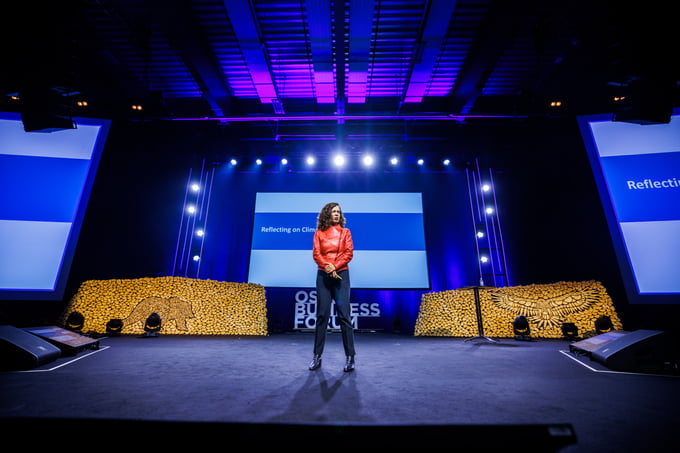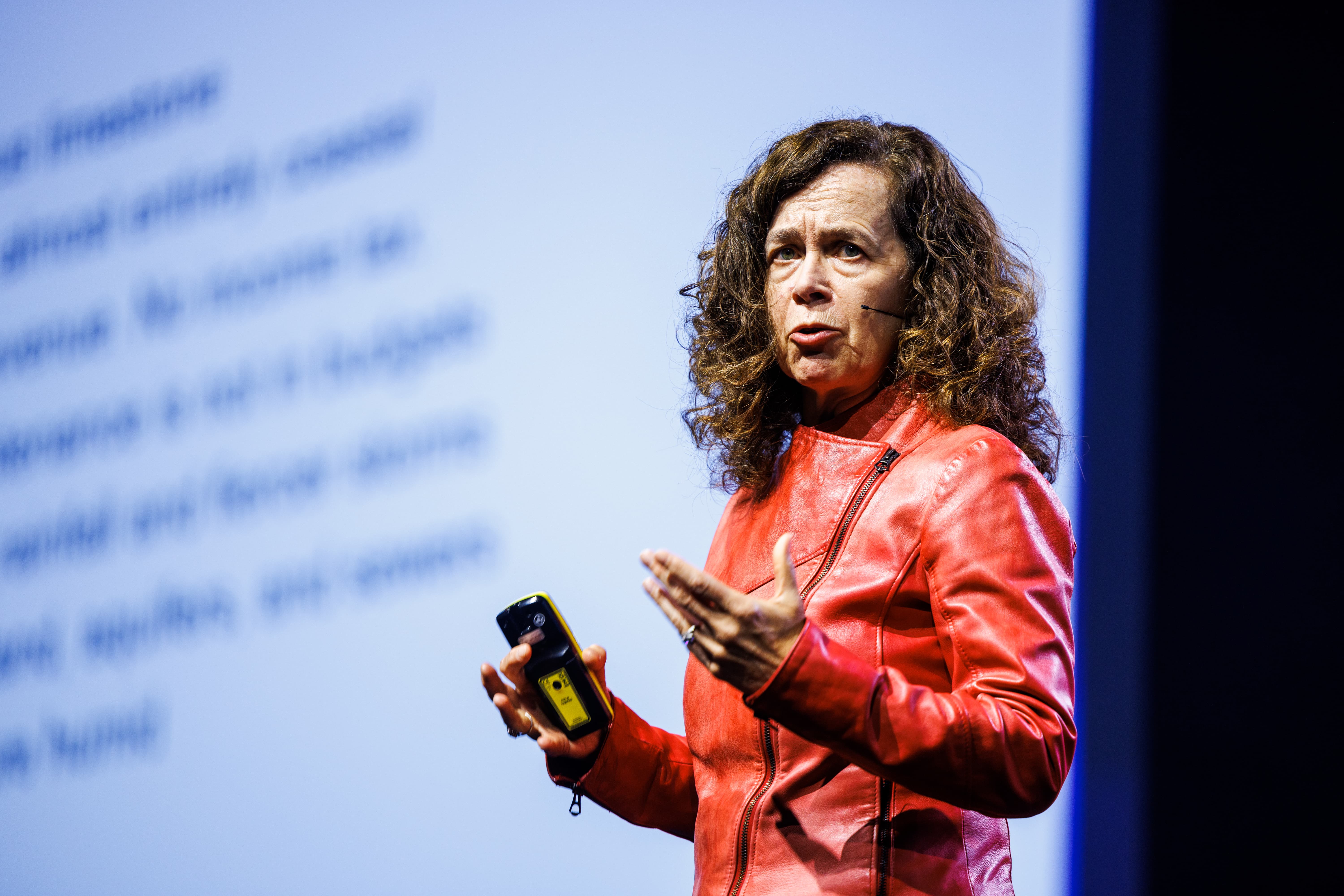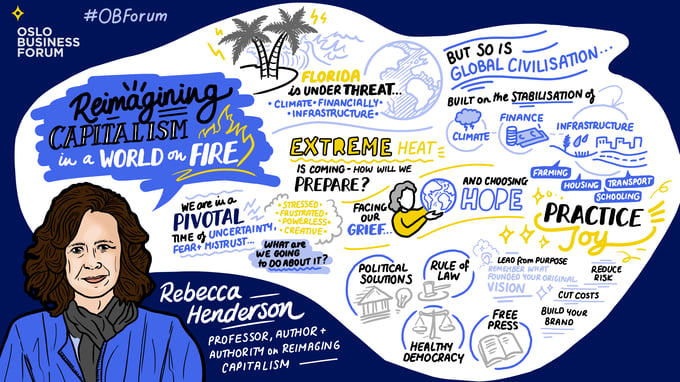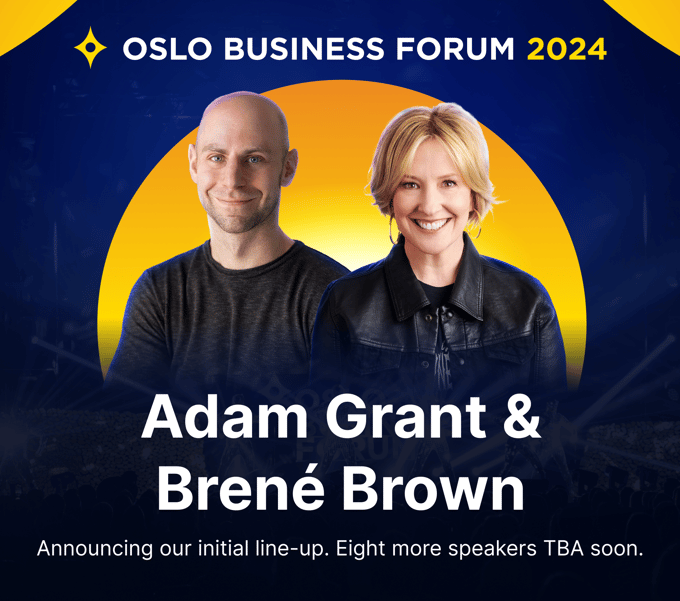Rebecca's most recent book, Reimagining Capitalism in a World on Fire, was shortlisted for the FT/McKinsey 2020 Business Book of the Year Award. The book is part of a broader conversation about the role of capitalism in addressing some of the world's most pressing global challenges.
Henderson believes it is possible for business leaders to create a better, more sustainable future—but only if we act with urgency and in concert with one another. In a session at Oslo Business Forum 2023, Rebecca emphasized how sustainability and ethical decision-making are critical for the health of the bottom line and the health of our planet.
Reflections on Climate Change
To demonstrate the impact of climate change, Rebecca walked leaders through the current path to bankruptcy in the state of Florida in the U.S.
She described first how an economy is supposed to work. People settle somewhere because they like it. They build community and government, developers borrow money to build, and people migrate to the new location. Thus begins a cycle of a thriving community and economy.
For the last 50 years, this has been happening in Florida. Now, however, the markets that hold Florida together are collapsing. The state's aging and failing infrastructure and social programs require more spending, leading to an unsustainable spiral: governments will increase taxes and fees, people will leave, in-migration will slow or stop, property prices will fall, and government revenues will disappear. In this scenario, Florida goes bankrupt.
"It doesn't have to happen," Rebecca said. "We could solve this problem."
Rebecca's story is not just about Florida but about civilization. It is a story about destabilizing what we've built.
The Importance of Climate to Civilization
The first humans settled ten thousand years ago, at a time when the climate had stabilized. They built systems, government, infrastructure, and, eventually, finance. At that time, Rebecca said, "The climates of civilization were perfect for humans—but now we're changing things."
Today, we are emitting fossil fuels in enormous quantities, and the planet is heating up. The challenge we face is not just rising temperatures; it is increasing variability. This variability leads to instability that threatens to collapse the very civilization that we built.
“Climate change isn't just about warmer weather; it's about instability.”
We are rocking the systems that support civilization by letting climate change continue. Right now, there are parts of the world where it is essentially impossible to walk outside for much of the year. This has dire consequences for agriculture and the other systems that we rely on.
“We're making the world literally too hot to hold us.”
%20(1).jpg?width=680&height=454&name=6M3A4893%20(2)%20(1).jpg) Rebecca Henderson is a professor at Harvard, a research fellow at the National Bureau of Economic Research, and a fellow of both the British and American Academies of Arts and Sciences. Her research explores how the private sector can play a role in building a more sustainable economy.
Rebecca Henderson is a professor at Harvard, a research fellow at the National Bureau of Economic Research, and a fellow of both the British and American Academies of Arts and Sciences. Her research explores how the private sector can play a role in building a more sustainable economy.
Rebecca asked leaders at Oslo Business Forum how this makes them feel. Responses ranged from depressed to frustrated to stressed to powerless. She acknowledged that she feels worried and her students feel angry. These emotions can lead to despair and denial. But, she said, "We can't do anything with denial or despair. We need to find a way to choose hope."
We should have hope because the world is moving. Her own students think climate change is one of the most important problems in the world. Thanks to action by individuals like them, there is evidence that the Green Revolution may have cut our expected warming for this century almost in half.
"We have the resources to begin to heal the damage, and we are deploying at scale," she said.

You Matter
"At this moment in human history, you have the opportunity to make a very significant difference," Rebecca said. "I believe the private sector, moving thoughtfully and together, can make an enormous difference in the problems that we face today. And I believe you can lead them."
Rebecca laid out what leaders need to do—in both their personal and professional lives—to make a difference.
1. In your personal life, start practicing joy. Spend just 15 minutes every day practicing gratitude, walking in nature, or doing something that connects you with your inner core. It is important for leaders to take care of themselves and remain grounded.
2. In your professional life, reimagine capitalism by leading with purpose. Rebecca believes that profit must be a means to an end, not an end in itself. If you build a purpose and embed it in the organization, your performance will increase.
Creating shared value. Businesses can make money and address public problems. Rebecca advocates for a shift in the fundamental purpose of corporations. Instead of focusing solely on profit, she believes businesses should adopt a broader purpose that includes creating shared value for all stakeholders.
Building cooperation. While she believes that individual businesses can make a significant difference, Rebecca also acknowledges that one organization alone is not enough. Businesses must collaborate to solve pressing global challenges. "A big part of reimagining capitalism is learning to cooperate," she said. "More than 200 alliances are attempting to do this across many sectors."
Rewiring finance and accounting. Many leaders have heard this before: if you can't measure it, it doesn't matter. Rebecca believes we are building an economy based not just on financial outcomes but on other outcomes we care about. She called on leaders to create the measures they need to drive their business strategically and ensure those outcomes are material, auditable, and replicable.
Rebuilding our institutions. Reimagining capitalism will require us to rebuild institutions to be more inclusive and socially responsible. Rebecca advocates that giving stakeholders a greater voice in decision-making can help businesses play a critical role in creating a more equitable and sustainable future.

Change is Never Easy
Rebecca has spent decades studying successful businesses that were not able to change. "Do not let this happen to your firms," she said. "If we do nothing, nothing will happen. You must [change] for the well-being of the world."
"If we do nothing, nothing will happen."
A shift is coming, and it is coming fast. Rebecca encouraged leaders to prepare by choosing one thing that will move their organization closer to acting from purpose. This small step can make a big impact. "We built civilization, and we can rebuild it if we need to," she said.
Key Points
- We are rocking the systems that support our civilization by letting climate change continue.
- Business leaders can create a better, more sustainable future—but only if we act with urgency and together.
- Leaders today must reimagine capitalism by leading with purpose. Building a purpose and embedding it in the organization will increase your performance.
- Rebecca's Roadmap to Reimagining Capitalism guides leaders to create shared value, build cooperation, rewire finance and accounting, and rebuild our institutions.
Questions to Consider
- Can business leaders save the world? Can you?
- How does climate change make you feel? Frustrated? Powerless?
- What steps can you take to move from hopelessness to hope? Can you bring your team with you?
- What is one thing you can do to move yourself and your organization closer to acting from purpose?

Want to be a part of the OBF community? Join Oslo Business Forum 2024: Courageous Leadership now!
